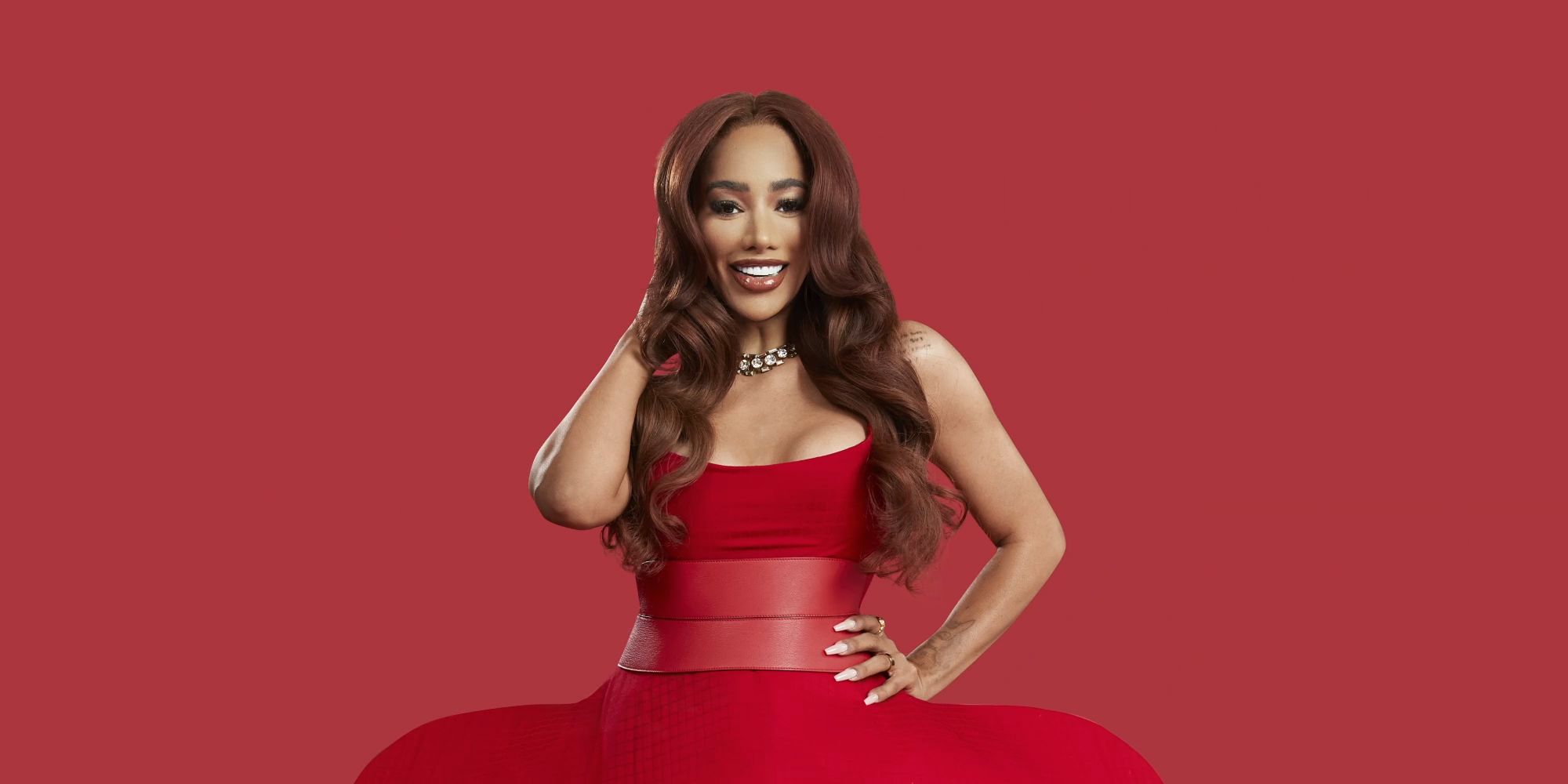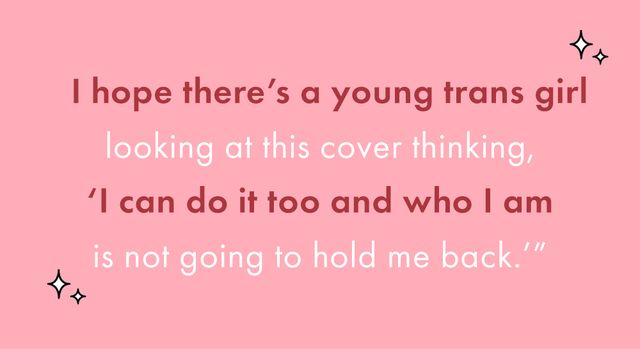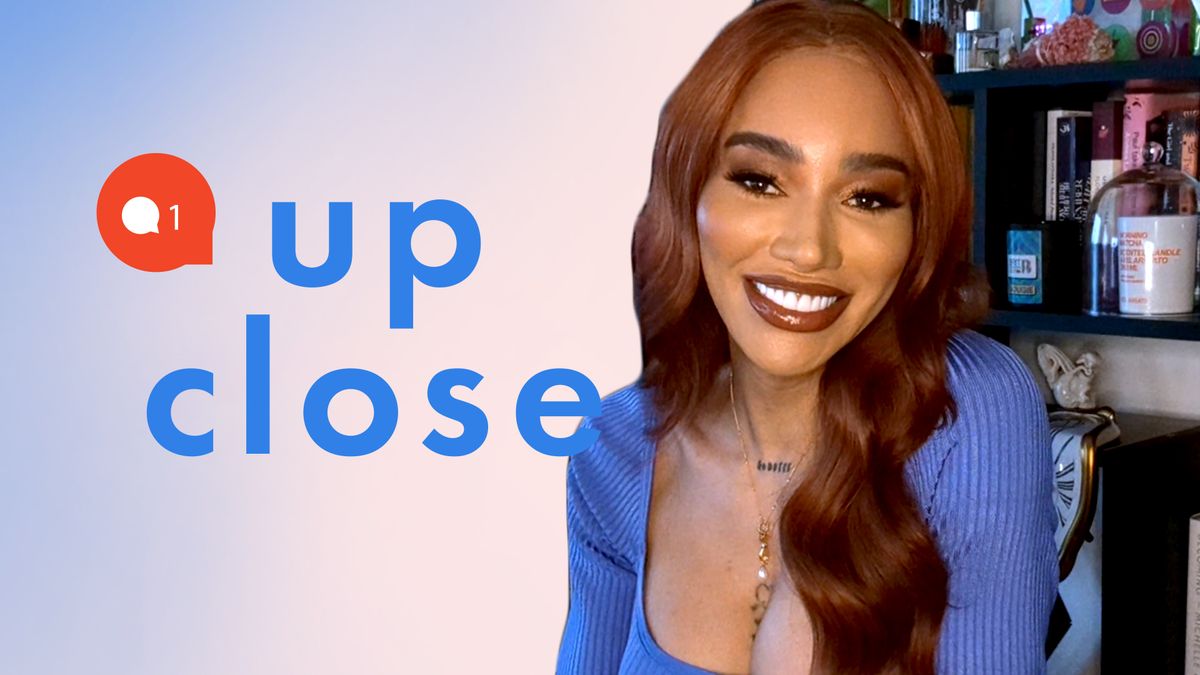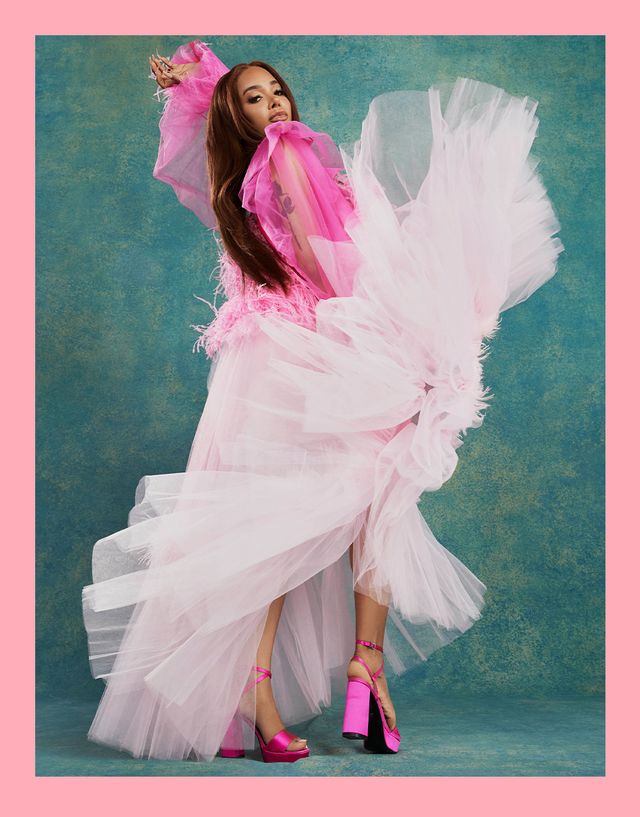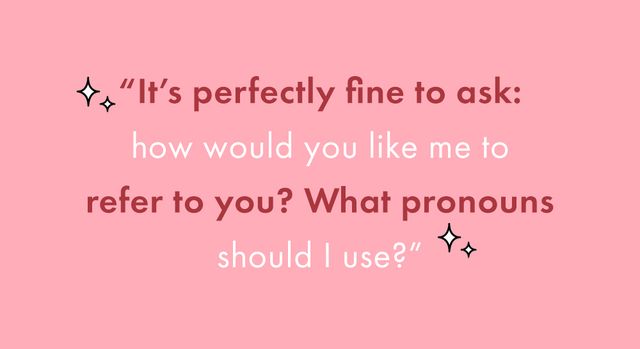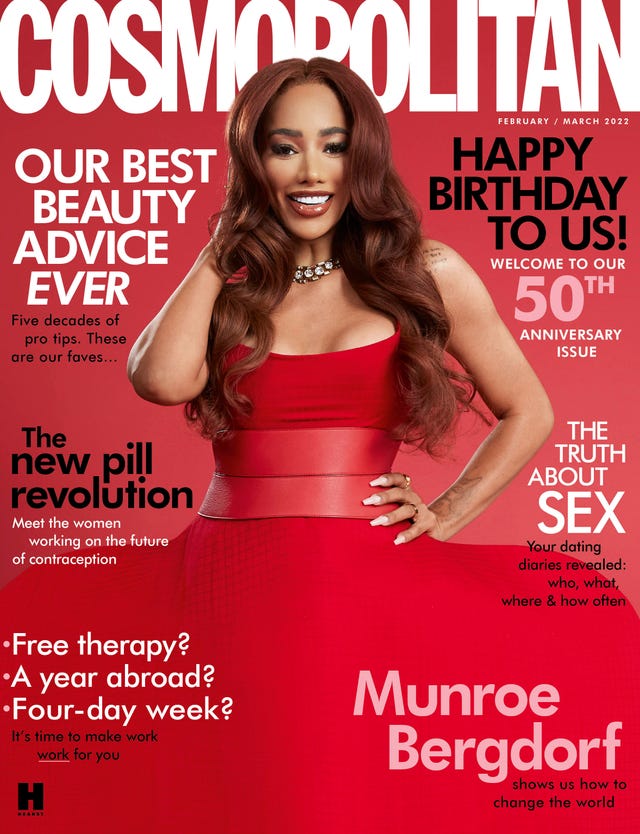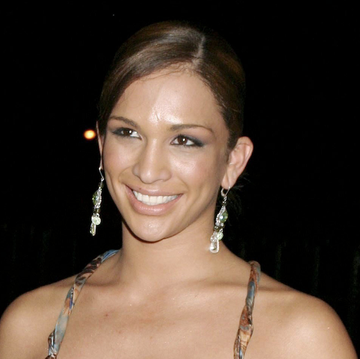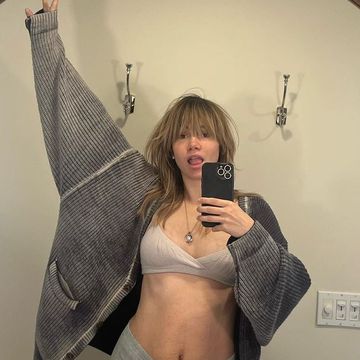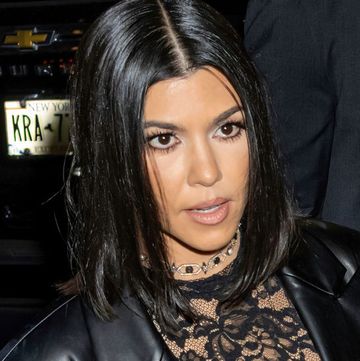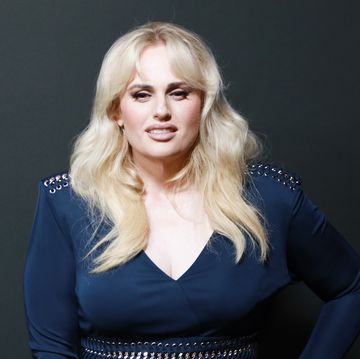"I’m so excited!" grins Munroe Bergdorf, her face literally and metaphorically lighting up as she settles in front of a huge mirror backstage. Just a few minutes earlier, she bounced into the west London studio, make-up-free, bang on time and full of energy (well, after her much-needed Starbucks order arrived).
As Munroe steps on to set in a killer red dress (reminiscent of the one worn on Cosmopolitan’s very first cover), her self-confidence radiates. This is a woman who not only knows how to work a photo shoot but, more importantly, knows who she is when the cameras stop rolling. But the journey to get here hasn’t been easy.
A model, presenter, author and podcaster, Munroe has dedicated much of her life to activism, and back in 2018 we crowned her Changemaker of the Year at our Influencer Awards. Championing LGBTQ+ rights as patron of Mermaids (a charity supporting trans youth) and becoming an advocate for UN Women UK, her work has helped thousands. But this trailblazing has come at a cost, putting Munroe in the firing line for trolling, even resulting in her leaving Twitter last year, saying, "It's not safe for trans people."
Despite this, Munroe has continued to push herself – and the causes that matter – forward. So, as we celebrate 50 years of Cosmopolitan, we invited three fellow writers, activists and campaigners to sit down with Munroe. Discussing race, gender and ‘femininity’, they look at how the past 50 years have shaped us and the change that needs to happen in the next 50.
"When you understand who you are, your path becomes clearer"
Munroe speaks to Aja Barber, a writer, stylist and consultant who deals with the intersectionality of sustainability in fashion.
A: Did you always have a strong idea of where you were going?
M: No, I think where I’m going [now] is a result of understanding who I am. And that has definitely been a process of elimination, a process of severe highs and lows. I think when you understand who you are, the path you’re on becomes a lot clearer. The path I’m on now is a result of me focusing on trying to understand myself on a deep level and trying to live my life in a purposeful way.
A: You talk about the highs, what would be a career high for you?
M: The Qween’s Speech [where Munroe, among others, broadcast an alternative version of the Queen’s speech] with Sam Smith, Gareth Pugh, Aries Moross, Rina Sawayama and Kai-Isaiah Jamal. I just thought it was a real moment of solidarity and showed the richness and diversity of our community and that we’re stronger together. In the face of so much divisiveness that we are fed on a daily basis, [it showed] we will succeed if we come together.
A: What galvanises you?
M: I think the strength of Black women, and the resilience of being the most marginalised people on the planet. Knowing I’m part of that sisterhood gives me so much hope and strength.
A: I feel the same. I’m happy to call you a sister. I look around and sometimes it can feel hopeless. But then you see people doing amazing things.
M: Marginalised voices, especially Black voices within the climate change movement [for example], are so rarely given the same opportunities their white counterparts are. Climate and sustainability are two things I’m trying to educate myself about on a deeper level. As someone who’s worked with fast fashion brands in the past, your work has opened my eyes to how I can be contributing to that problem. It’s something I’ve definitely taken on board.
A: You use your platform in such an effective way. When using social media, how can people ensure they are being more inclusive of all communities?
M: I think knowing when to talk and when to listen is key. You can still use your platform without talking. When you educate yourself, you understand whose voices need to be listened to within movements and you can use your platform to amplify those voices. It’s crucial to not centre yourself within conversations that you’re new to.
A: What have you learned from the career space you exist in as a marginalised trans person?
M: I’ve learned a lot. Sometimes I feel frustrated being the only Black transperson, or the only trans person in the room. I don’t want to be a token, the first and last – there needs to be a plan in place to incorporate that inclusion long-term.
A: When you look back at being a trans teenager, what has changed for young people today?
M: Now, so many young trans people have people they can look up to and they can see themselves in. [They can] think, ‘I may not want to be a Hollywood actress or an activist, but it’s a possibility for me and I can dream as big. I can do whatever I want to do, because they achieved what they wanted to achieve.’ That’s something I’m really proud of – hopefully, somewhere, there’s a young trans girl looking at this cover thinking, ‘I can do it too and who I am is not going to hold me back.’
A: Where do you find your joy?
M: My joy used to be work and then I found that wasn’t sustainable. I think because I’ve worked so hard to get to this place professionally, I wanted to focus on it – I wanted to give it as much of my time, energy and heart as possible. I realised I was putting myself on the back-burner. I get the most joy when I’m just being present. It could be a one-on-one chat with someone I love, experiencing a place of natural beauty... not thinking about what I have on the next day, or my problems and insecurities. Just being there and enjoying being alive.
A: Everyone I know admires you. Who do you admire and what inspires you?
M: I’m inspired by anyone that is passionate about something. There’s so much going on in the world, I think it’s quite easy to become numb. I’ve definitely become numb at points. But I think people that are passionate about things are inspiring, whatever that thing is, as long as they’re not hurting anyone. That’s the way you inspire future generations. The impact of a great teacher is insurmountable. My English lecturer at university saved my life. Without her being passionate about creative writing and encouraging me to be passionate about my ability to write, I wouldn’t be doing what I’m doing now. Passion really can save a life and often it will happen without you being aware.
"I grew up with the internet and the impact it’s had is still not clear"
Munroe speaks with Vic Parsons, gender and identity reporter at PinkNews.
V: Your podcast episodes begin by introducing your guests and their pronouns. Do you hope this will become more accepted in society generally?
M: I really hope it becomes more commonplace. There’s this narrative that trans people are the only ones who have pronouns, so I would like to see us asking cis people their pronouns, too. It doesn’t need to be a big deal.
V: You use dual pronouns: she and they. What about this feels right for you?
M: I am a woman who understands that gender is a construct. I have a lot of non-binary friends and we use ‘they’ pronouns for everyone – we’re moving forward into a world where gender will have much less importance. I feel freer when someone uses ‘they’.
V: What advice would you give someone unfamiliar with dual pronouns, who might be worried about offending someone or 'doing it wrong'?
M: It’s perfectly fine to ask: how would you like me to refer to you? What pronouns should I use? I think it shows understanding and compassion to care about how someone feels in how you refer to them. Opening up a dialogue with someone as to how they feel comfortable is a generous thing to do.
V: Social media is one of the biggest changes of the past 50 years. What positives and negatives has it brought?
M: A huge positive is it has given the working class a voice. Marginalised people can communicate with each other. We’re more aware of how society functions than ever before and that’s an incredible thing. The worst thing is we don’t entirely understand the social media we’re navigating, or the long-term implications for our mental health. I grew up with the internet and the impact it’s had on our generation still isn’t clear.
V: A lot of trans-rights discourse happens online. Where would you like to move this conversation, and how would you like it to change?
M: We need to have these conversations in the real world and in the mainstream. To do that, we need to platform trans voices – we can’t keep being subjected to this nonsense of non-trans people offering up their opinions on a community they’re not part of. Trans rights do not have a negative impact on cisgender people. Trans equality is everyone’s equality. It is access to healthcare, it’s equal education in schools. There’s this idea that we as trans people are making people trans, and it’s the same rubbish that was peddled with the gay, lesbian and bi community. The reality is, if someone’s trans, they’re trans. So by teaching an accurate depiction of the way the world is, you are preparing people for their own realities.
V: There’s so much public misinformation about gender identity. What’s the one thing that you wish people realised?
M: We all have a gender identity. And as scary as it is to explore your own gender, it’s liberating. Because the place on the other side of that is freedom. When you let go of everything you’re supposed to be, you will accept other people and, most importantly, you’ll accept yourself.
V: What advice would you give someone who is questioning their gender?
M: The best advice I have is there’s no one way to be trans. Gravitate towards what you feel, rather than what you feel you should do. You’ll find so much peace that way. When I began my transition, I felt pressure to assimilate into what society deems to be a woman. I wish someone had just told me, no matter how I dress, how I look, if I’ve got make-up on or if I don’t, I’m still a woman. In every single iteration of my being.
V: You’ve talked about growing from mistakes. How does cancel culture impact this?
M: Sometimes it’s important to call people out if they’re not listening or show no remorse for the harm they’ve caused. I personally try not to call people out, because I feel like it’s much more important for us to focus on the system of oppression, rather than individual instances, because the individual instances are a symptom of the system. I feel like we often get distracted by the smaller things.
"I feel a spark has been lit"
Munroe speaks with River Gallo, a Salvadoran-American filmmaker, actor, model and intersex rights activist.
R: So, we're here having this conversation as you’re on the cover of Cosmopolitan for their anniversary issue. How does that feel?
M: Honestly, I haven’t fully processed it yet. When we were shooting, I had
a moment when I was in a massive dress and thought, ‘Oh my god, this is happening.’ It fills me with joy and pride.
R: In terms of what you see next, if you could envision a dream world 50 years from now, what would you see?
M: I want people to interrogate what they have always taken as truth. Interrogate your bias. Interrogate everything you know. It’s such a freeing thing. But if we want to progress as a society, then we need to think about the way things could be. Equality doesn’t [currently] exist. We live within a system that thrives on equality. We need to think about how we can build a system where all of us can win.
R: What do you think are some other ways we can reach this dream world?
M: Ultimately, it does come down to healing. If you're a healed person and focussed on living your life in a way that empowers and uplifts yourself and other people, then you are not going to treat people in a way that ignores their calls for equality. I think recognising the fractures within society and remedying them will allow us to progress. We live in this constant state of denial about racism, misogyny, homophobia and transphobia.
R: In terms of looking at the queer trans LGBTQIA+community, what is something you think our community overlooks and that we need to shine more light on?
M: We often overlook our desire to assimilate into systems that are to our own detriment. As marginalised people, we often feel as though we need to be part of what’s going on rather than build something pioneering. Do we really want equality with something that was built to keep us out? Or do we want to build new things that are inclusive from the get-go? Take an institution such as marriage. I think it’s amazing, and if you want to get married you definitely should. But I think it’s also very powerful to understand that marriage was literally about owning women and land originally... I struggle with these things that are inherently rooted in misogyny [that] we still want to be [a] part of.
R: I think it’s a really enlightening point to bring up, just looking towards the future...
M: I think it’s empowering to change the narrative. Because when I was growing up, I didn’t want to be gay. I didn't want to be queer. I didn’t want to be trans. I didn’t want to be Black. Because I wanted to be part of what I saw around me and I didn’t see myself in my surroundings.
R: In the next 50 years, how would you like the representation of trans, non-binary, gender variant and intersex people to change in the media?
M: For starters, more intersex voices. I want to see us as a society grapple
with things that are still on the fringes. We need to get to a point where we are embracing difference. We have seen how it can happen. How gay men have succeeded. Obviously, homophobia is not a thing of the past, but the way gay men can now be in spaces and the focus is not that they are gay. The focus is that they are just there, doing their job.
R: As an intersex person, it is music to my ears. What are you hopeful for?
M: I believe in the people. I believe a lot of the issues we are currently seeing are being enforced by the 1%, and the 1% are not indicative of everyone. I believe the people want trans inclusion, racial equality, to end misogyny so women and girls feel safe walking home at night. I don’t think we have ever been as enlightened as a people as we are now, even if there is a lot of misinformation around. I do feel like the spark has been lit. Less people are passively accepting what they have been presented with and that’s an incredible thing. It shows there’s only so long that people can hold on to a world that doesn’t exist anymore, before embracing a new one. ◆
Cosmopolitan's 50th anniversary issue is on sale 21 January
